Attached files
| file | filename |
|---|---|
| EX-99.1 - EX-99.1 - Ryerson Holding Corp | ryi-ex991_6.htm |
| 8-K - 8-K - Ryerson Holding Corp | ryi-8k_20200304.htm |
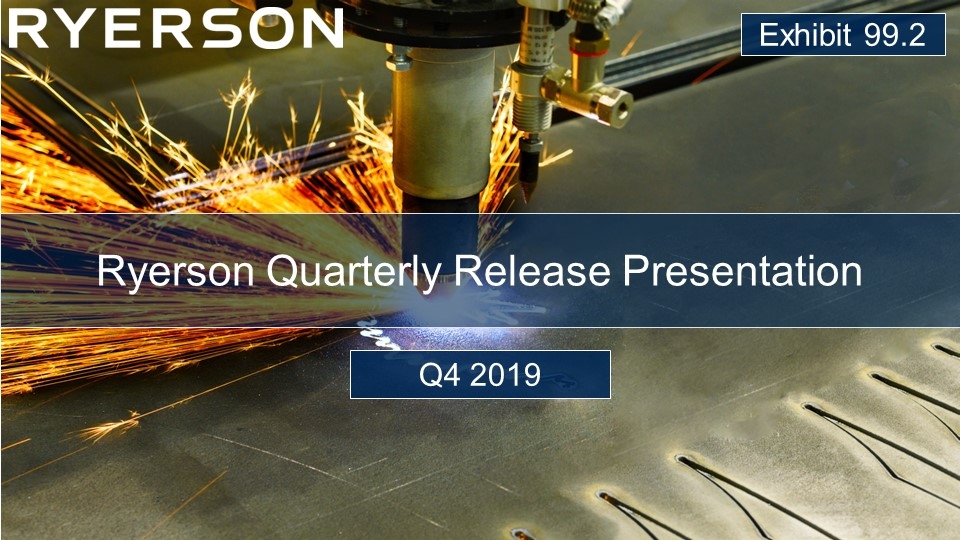
Q4 2019 Ryerson Quarterly Release Presentation Exhibit 99.2
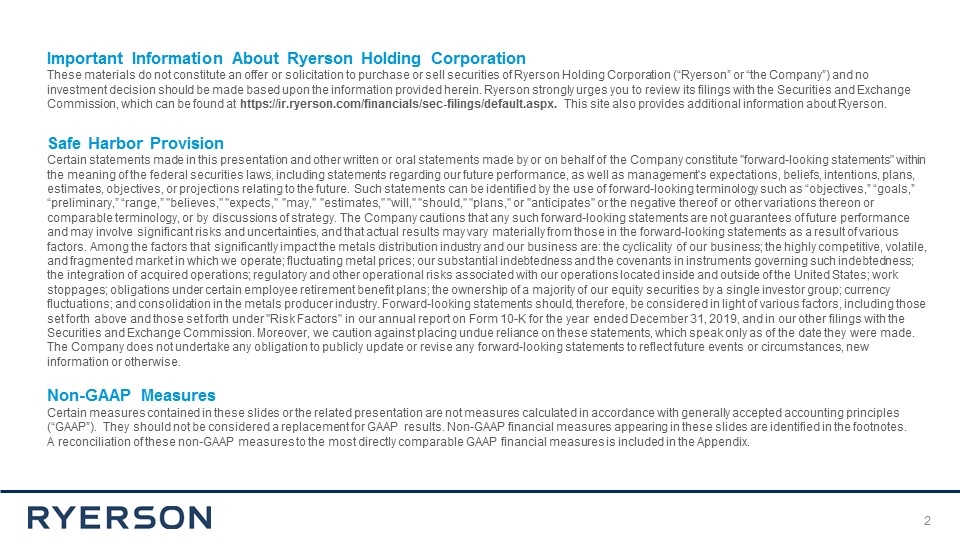
31 Important Information About Ryerson Holding Corporation These materials do not constitute an offer or solicitation to purchase or sell securities of Ryerson Holding Corporation (“Ryerson” or “the Company”) and no investment decision should be made based upon the information provided herein. Ryerson strongly urges you to review its filings with the Securities and Exchange Commission, which can be found at https://ir.ryerson.com/financials/sec-filings/default.aspx. This site also provides additional information about Ryerson. Safe Harbor Provision Certain statements made in this presentation and other written or oral statements made by or on behalf of the Company constitute "forward-looking statements" within the meaning of the federal securities laws, including statements regarding our future performance, as well as management's expectations, beliefs, intentions, plans, estimates, objectives, or projections relating to the future. Such statements can be identified by the use of forward-looking terminology such as “objectives,” “goals,” “preliminary,” “range,” "believes," "expects," "may," "estimates," "will," "should," "plans," or "anticipates" or the negative thereof or other variations thereon or comparable terminology, or by discussions of strategy. The Company cautions that any such forward-looking statements are not guarantees of future performance and may involve significant risks and uncertainties, and that actual results may vary materially from those in the forward-looking statements as a result of various factors. Among the factors that significantly impact the metals distribution industry and our business are: the cyclicality of our business; the highly competitive, volatile, and fragmented market in which we operate; fluctuating metal prices; our substantial indebtedness and the covenants in instruments governing such indebtedness; the integration of acquired operations; regulatory and other operational risks associated with our operations located inside and outside of the United States; work stoppages; obligations under certain employee retirement benefit plans; the ownership of a majority of our equity securities by a single investor group; currency fluctuations; and consolidation in the metals producer industry. Forward-looking statements should, therefore, be considered in light of various factors, including those set forth above and those set forth under "Risk Factors" in our annual report on Form 10-K for the year ended December 31, 2019, and in our other filings with the Securities and Exchange Commission. Moreover, we caution against placing undue reliance on these statements, which speak only as of the date they were made. The Company does not undertake any obligation to publicly update or revise any forward-looking statements to reflect future events or circumstances, new information or otherwise. Non-GAAP Measures Certain measures contained in these slides or the related presentation are not measures calculated in accordance with generally accepted accounting principles (“GAAP”). They should not be considered a replacement for GAAP results. Non-GAAP financial measures appearing in these slides are identified in the footnotes. A reconciliation of these non-GAAP measures to the most directly comparable GAAP financial measures is included in the Appendix.
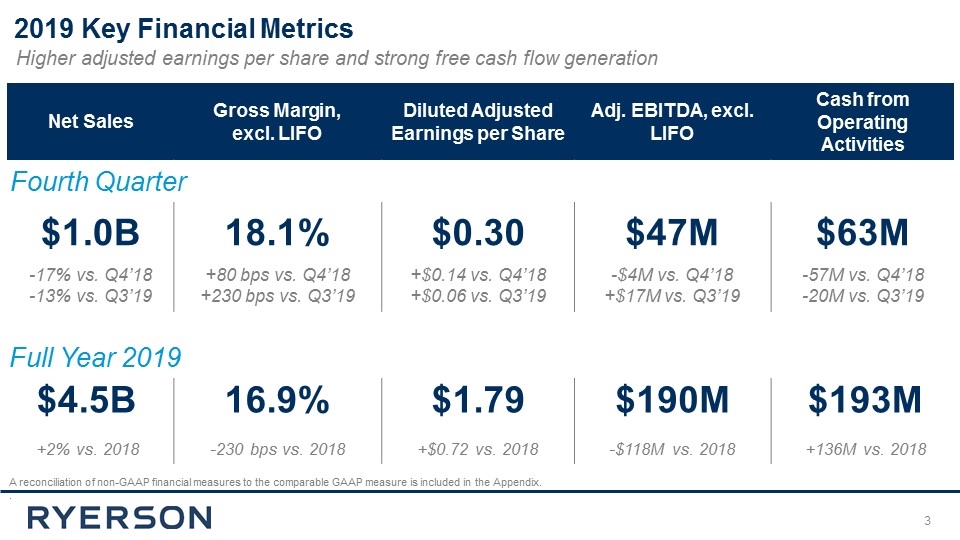
2019 Key Financial Metrics A reconciliation of non-GAAP financial measures to the comparable GAAP measure is included in the Appendix. . Higher adjusted earnings per share and strong free cash flow generation Net Sales Gross Margin, excl. LIFO Diluted Adjusted Earnings per Share Adj. EBITDA, excl. LIFO Cash from Operating Activities $1.0B 18.1% $0.30 $47M $63M -17% vs. Q4’18 -13% vs. Q3’19 +80 bps vs. Q4’18 +230 bps vs. Q3’19 +$0.14 vs. Q4’18 +$0.06 vs. Q3’19 -$4M vs. Q4’18 +$17M vs. Q3’19 -57M vs. Q4’18 -20M vs. Q3’19 $4.5B 16.9% $1.79 $190M $193M +2% vs. 2018 -230 bps vs. 2018 +$0.72 vs. 2018 -$118M vs. 2018 +136M vs. 2018 Fourth Quarter Full Year 2019
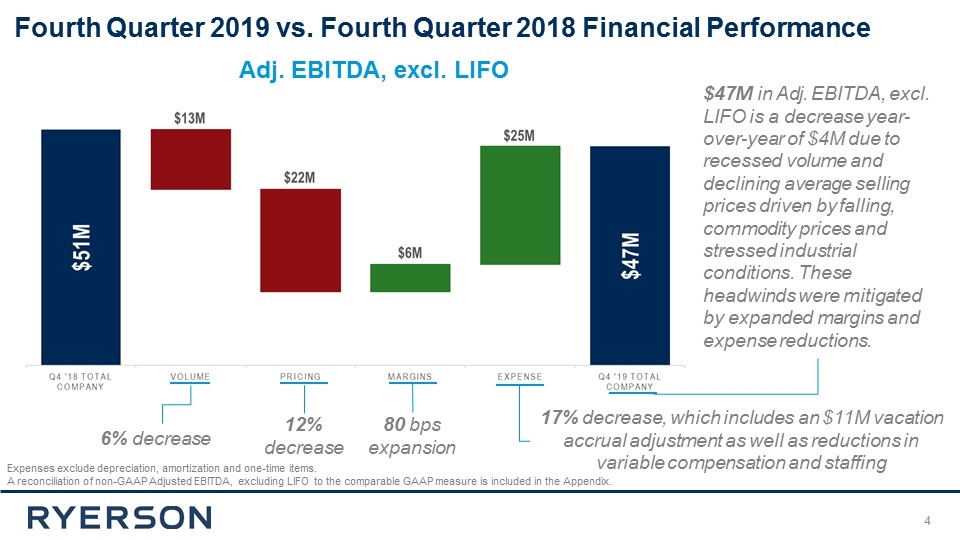
Fourth Quarter 2019 vs. Fourth Quarter 2018 Financial Performance 6% decrease 12% decrease 17% decrease, which includes an $11M vacation accrual adjustment as well as reductions in variable compensation and staffing Expenses exclude depreciation, amortization and one-time items. A reconciliation of non-GAAP Adjusted EBITDA, excluding LIFO to the comparable GAAP measure is included in the Appendix. $47M in Adj. EBITDA, excl. LIFO is a decrease year-over-year of $4M due to recessed volume and declining average selling prices driven by falling, commodity prices and stressed industrial conditions. These headwinds were mitigated by expanded margins and expense reductions. Adj. EBITDA, excl. LIFO 80 bps expansion
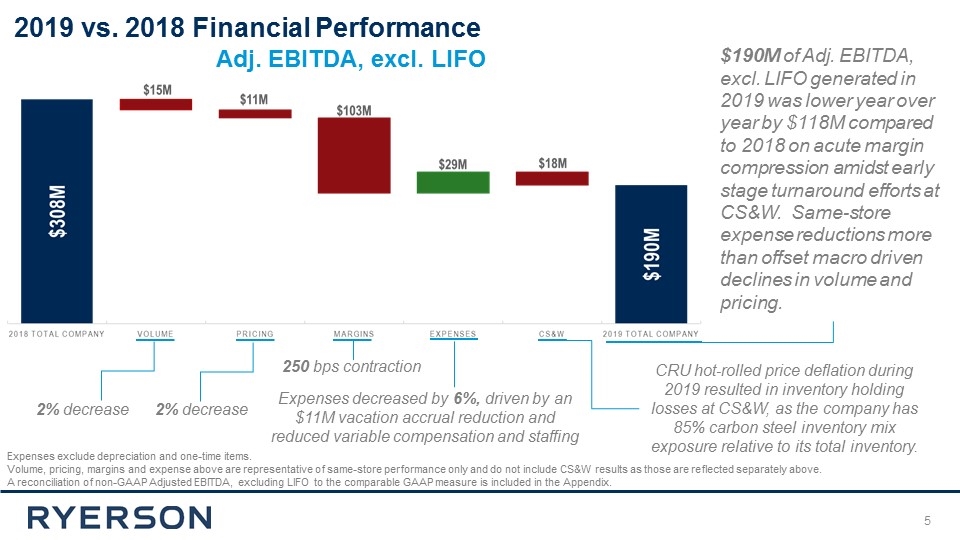
2019 vs. 2018 Financial Performance 2% decrease 2% decrease 250 bps contraction Expenses decreased by 6%, driven by an $11M vacation accrual reduction and reduced variable compensation and staffing Expenses exclude depreciation and one-time items. Volume, pricing, margins and expense above are representative of same-store performance only and do not include CS&W results as those are reflected separately above. A reconciliation of non-GAAP Adjusted EBITDA, excluding LIFO to the comparable GAAP measure is included in the Appendix. $190M of Adj. EBITDA, excl. LIFO generated in 2019 was lower year over year by $118M compared to 2018 on acute margin compression amidst early stage turnaround efforts at CS&W. Same-store expense reductions more than offset macro driven declines in volume and pricing. Adj. EBITDA, excl. LIFO CRU hot-rolled price deflation during 2019 resulted in inventory holding losses at CS&W, as the company has 85% carbon steel inventory mix exposure relative to its total inventory.
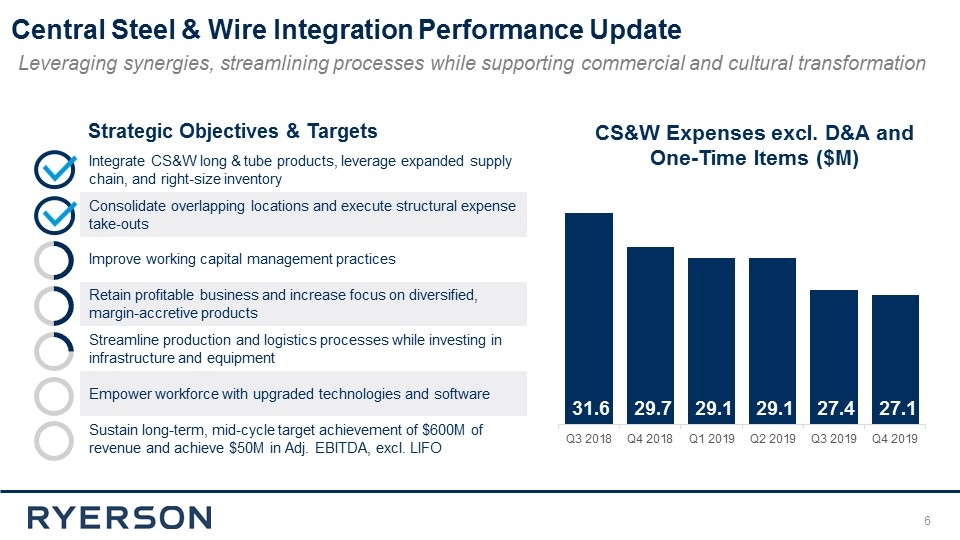
Central Steel & Wire Integration Performance Update Leveraging synergies, streamlining processes while supporting commercial and cultural transformation Integrate CS&W long & tube products, leverage expanded supply chain, and right-size inventory Consolidate overlapping locations and execute structural expense take-outs Improve working capital management practices Retain profitable business and increase focus on diversified, margin-accretive products Streamline production and logistics processes while investing in infrastructure and equipment Empower workforce with upgraded technologies and software Sustain long-term, mid-cycle target achievement of $600M of revenue and achieve $50M in Adj. EBITDA, excl. LIFO CS&W Expenses excl. D&A and One-Time Items ($M) Strategic Objectives & Targets
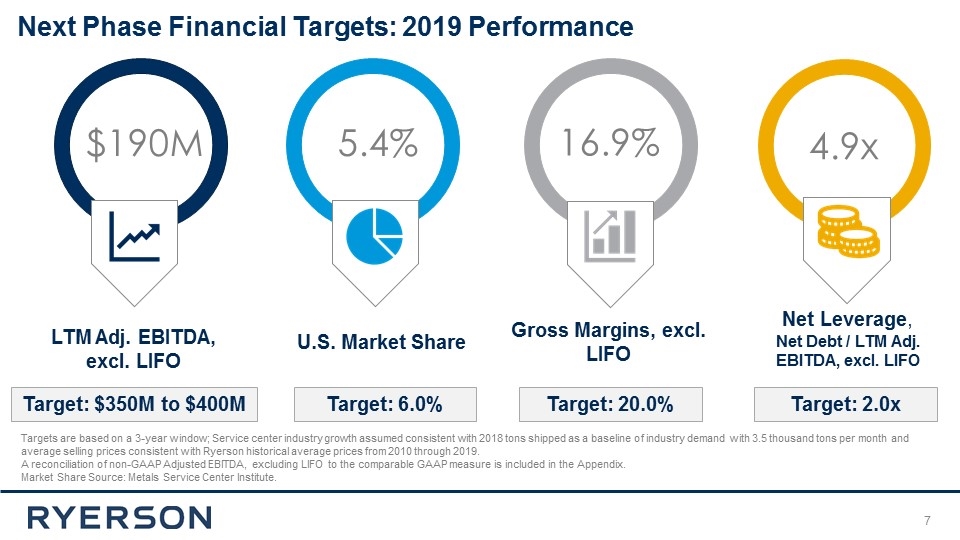
Next Phase Financial Targets: 2019 Performance 16.9% Gross Margins, excl. LIFO Target: 20.0% 5.4% U.S. Market Share Target: 6.0% Targets are based on a 3-year window; Service center industry growth assumed consistent with 2018 tons shipped as a baseline of industry demand with 3.5 thousand tons per month and average selling prices consistent with Ryerson historical average prices from 2010 through 2019. A reconciliation of non-GAAP Adjusted EBITDA, excluding LIFO to the comparable GAAP measure is included in the Appendix. Market Share Source: Metals Service Center Institute. $190M LTM Adj. EBITDA, excl. LIFO Target: $350M to $400M 4.9x Net Leverage, Net Debt / LTM Adj. EBITDA, excl. LIFO Target: 2.0x
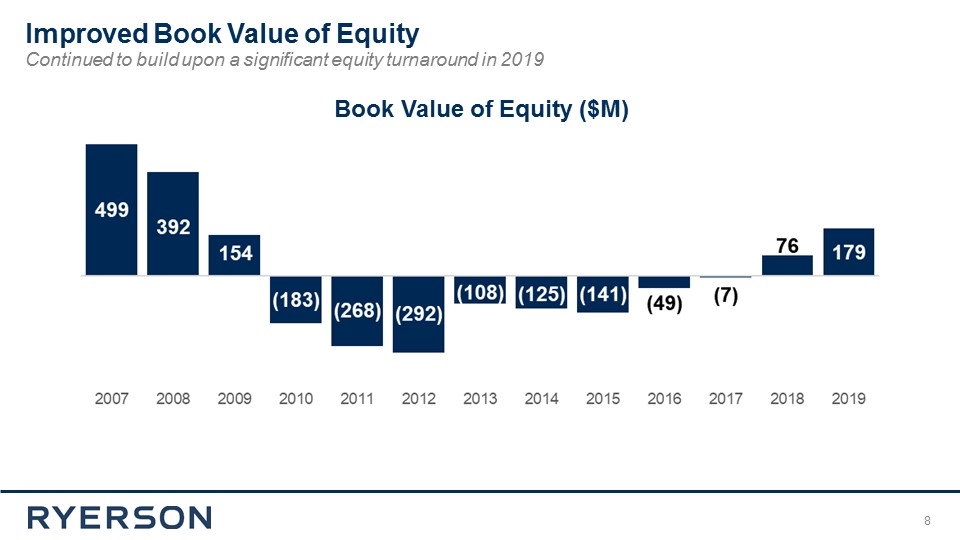
Improved Book Value of Equity Continued to build upon a significant equity turnaround in 2019 Book Value of Equity ($M)
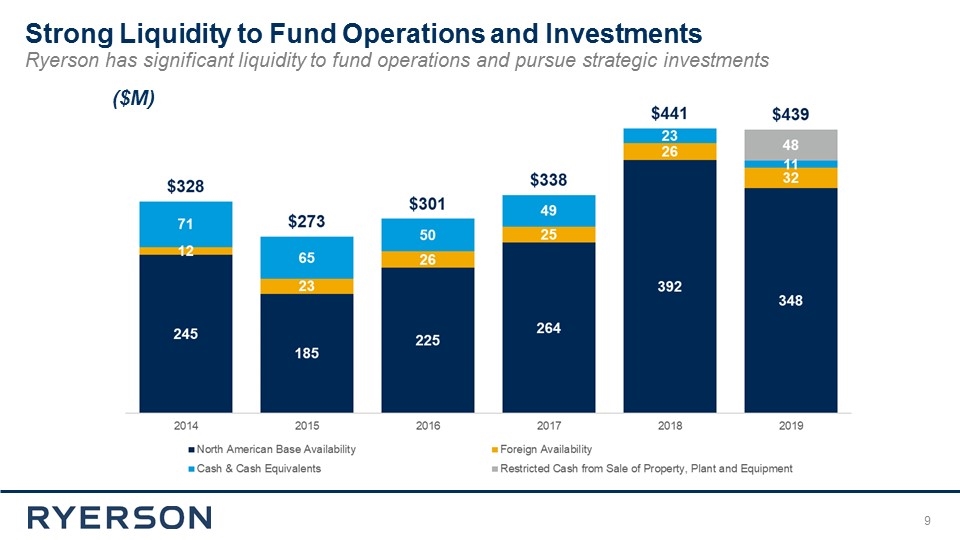
Strong Liquidity to Fund Operations and Investments Ryerson has significant liquidity to fund operations and pursue strategic investments ($M)
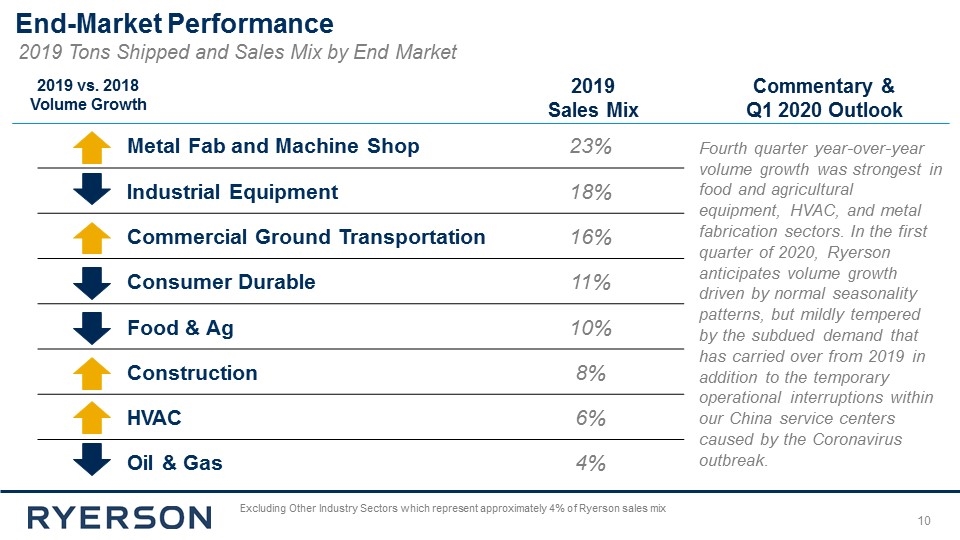
End-Market Performance 2019 Tons Shipped and Sales Mix by End Market Metal Fab and Machine Shop 23% Industrial Equipment 18% Commercial Ground Transportation 16% Consumer Durable 11% Food & Ag 10% Construction 8% HVAC 6% Oil & Gas 4% Excluding Other Industry Sectors which represent approximately 4% of Ryerson sales mix Fourth quarter year-over-year volume growth was strongest in food and agricultural equipment, HVAC, and metal fabrication sectors. In the first quarter of 2020, Ryerson anticipates volume growth driven by normal seasonality patterns, but mildly tempered by the subdued demand that has carried over from 2019 in addition to the temporary operational interruptions within our China service centers caused by the Coronavirus outbreak. 2019 Sales Mix Commentary & Q1 2020 Outlook 2019 vs. 2018 Volume Growth
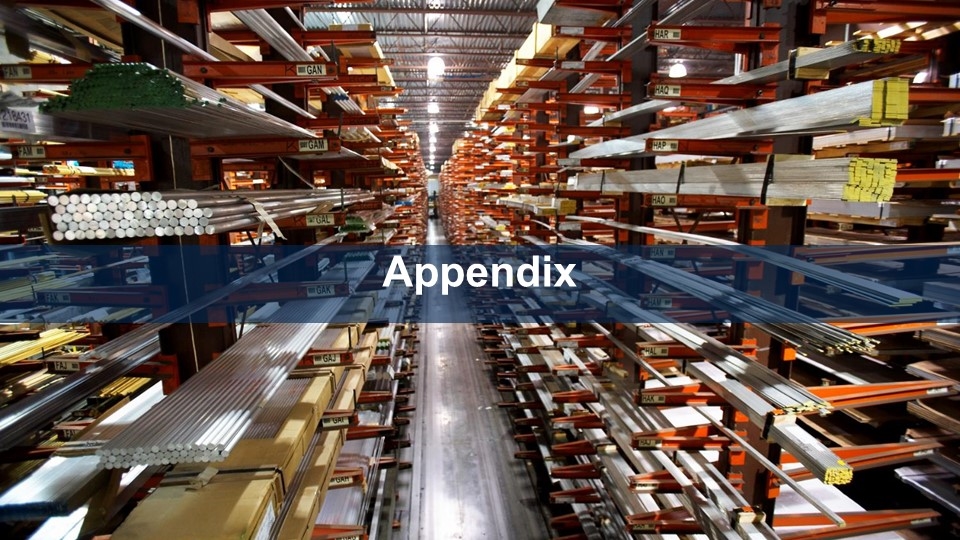
Appendix
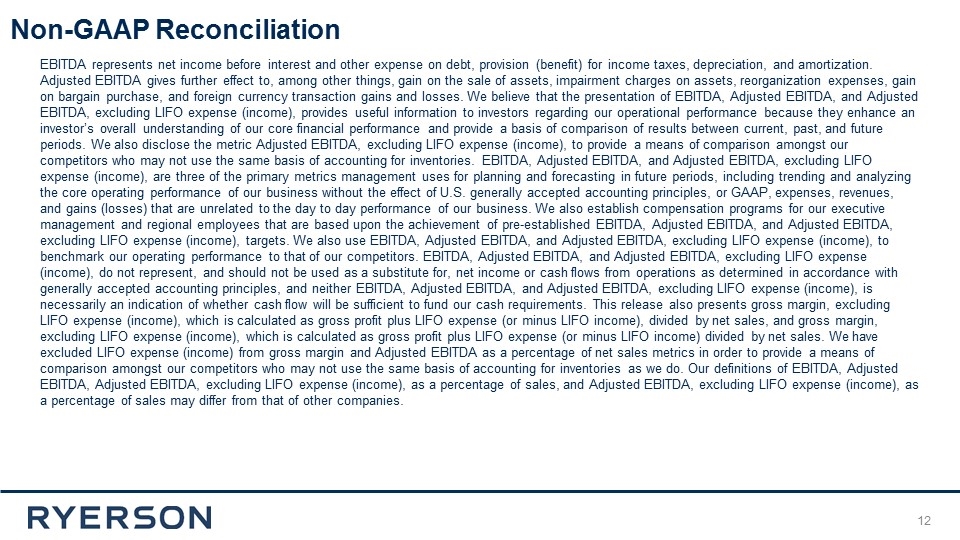
31 EBITDA represents net income before interest and other expense on debt, provision (benefit) for income taxes, depreciation, and amortization. Adjusted EBITDA gives further effect to, among other things, gain on the sale of assets, impairment charges on assets, reorganization expenses, gain on bargain purchase, and foreign currency transaction gains and losses. We believe that the presentation of EBITDA, Adjusted EBITDA, and Adjusted EBITDA, excluding LIFO expense (income), provides useful information to investors regarding our operational performance because they enhance an investor’s overall understanding of our core financial performance and provide a basis of comparison of results between current, past, and future periods. We also disclose the metric Adjusted EBITDA, excluding LIFO expense (income), to provide a means of comparison amongst our competitors who may not use the same basis of accounting for inventories. EBITDA, Adjusted EBITDA, and Adjusted EBITDA, excluding LIFO expense (income), are three of the primary metrics management uses for planning and forecasting in future periods, including trending and analyzing the core operating performance of our business without the effect of U.S. generally accepted accounting principles, or GAAP, expenses, revenues, and gains (losses) that are unrelated to the day to day performance of our business. We also establish compensation programs for our executive management and regional employees that are based upon the achievement of pre-established EBITDA, Adjusted EBITDA, and Adjusted EBITDA, excluding LIFO expense (income), targets. We also use EBITDA, Adjusted EBITDA, and Adjusted EBITDA, excluding LIFO expense (income), to benchmark our operating performance to that of our competitors. EBITDA, Adjusted EBITDA, and Adjusted EBITDA, excluding LIFO expense (income), do not represent, and should not be used as a substitute for, net income or cash flows from operations as determined in accordance with generally accepted accounting principles, and neither EBITDA, Adjusted EBITDA, and Adjusted EBITDA, excluding LIFO expense (income), is necessarily an indication of whether cash flow will be sufficient to fund our cash requirements. This release also presents gross margin, excluding LIFO expense (income), which is calculated as gross profit plus LIFO expense (or minus LIFO income), divided by net sales, and gross margin, excluding LIFO expense (income), which is calculated as gross profit plus LIFO expense (or minus LIFO income) divided by net sales. We have excluded LIFO expense (income) from gross margin and Adjusted EBITDA as a percentage of net sales metrics in order to provide a means of comparison amongst our competitors who may not use the same basis of accounting for inventories as we do. Our definitions of EBITDA, Adjusted EBITDA, Adjusted EBITDA, excluding LIFO expense (income), as a percentage of sales, and Adjusted EBITDA, excluding LIFO expense (income), as a percentage of sales may differ from that of other companies. Non-GAAP Reconciliation
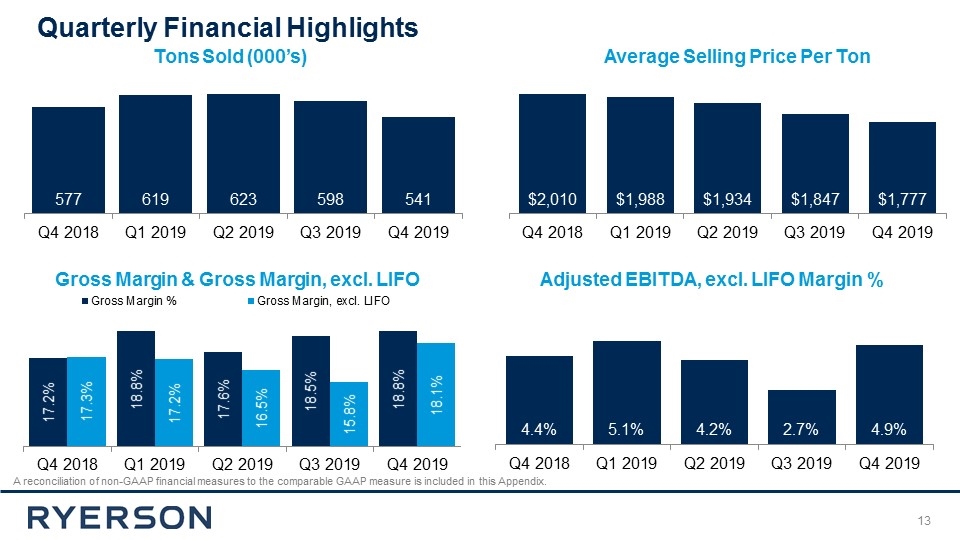
Quarterly Financial Highlights A reconciliation of non-GAAP financial measures to the comparable GAAP measure is included in this Appendix. Tons Sold (000’s) Average Selling Price Per Ton Adjusted EBITDA, excl. LIFO Margin % Gross Margin & Gross Margin, excl. LIFO
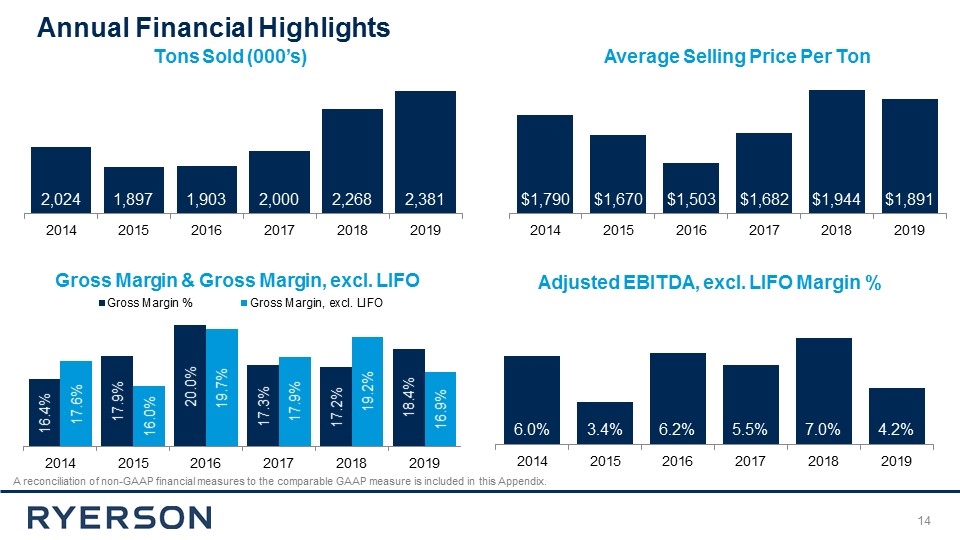
Annual Financial Highlights A reconciliation of non-GAAP financial measures to the comparable GAAP measure is included in this Appendix. Tons Sold (000’s) Average Selling Price Per Ton Gross Margin & Gross Margin, excl. LIFO Adjusted EBITDA, excl. LIFO Margin %
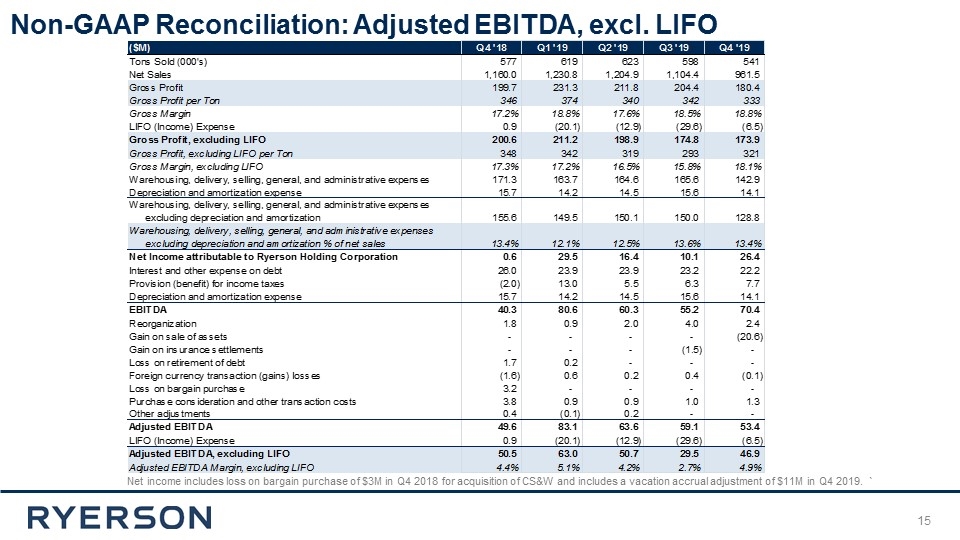
Non-GAAP Reconciliation: Adjusted EBITDA, excl. LIFO Net income includes loss on bargain purchase of $3M in Q4 2018 for acquisition of CS&W and includes a vacation accrual adjustment of $11M in Q4 2019. `
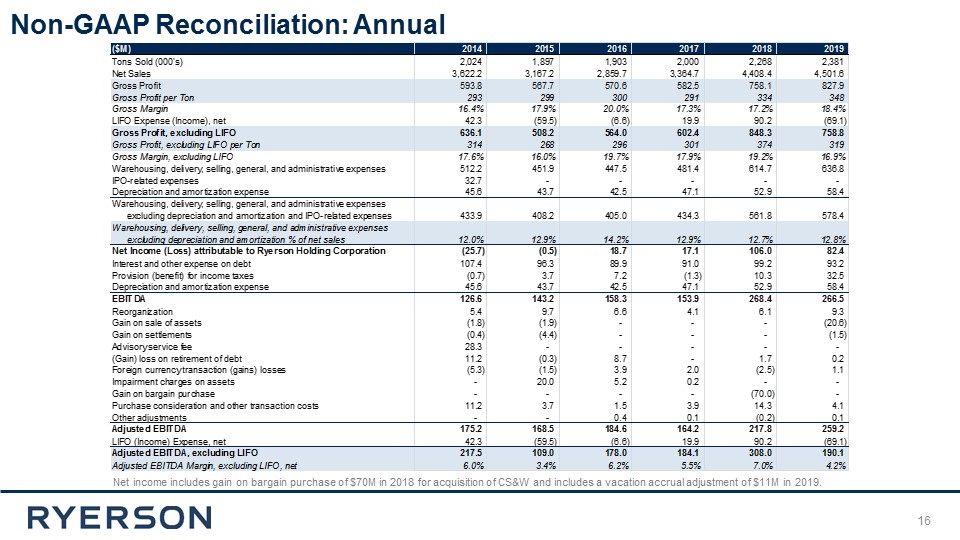
Non-GAAP Reconciliation: Annual Net income includes gain on bargain purchase of $70M in 2018 for acquisition of CS&W and includes a vacation accrual adjustment of $11M in 2019.
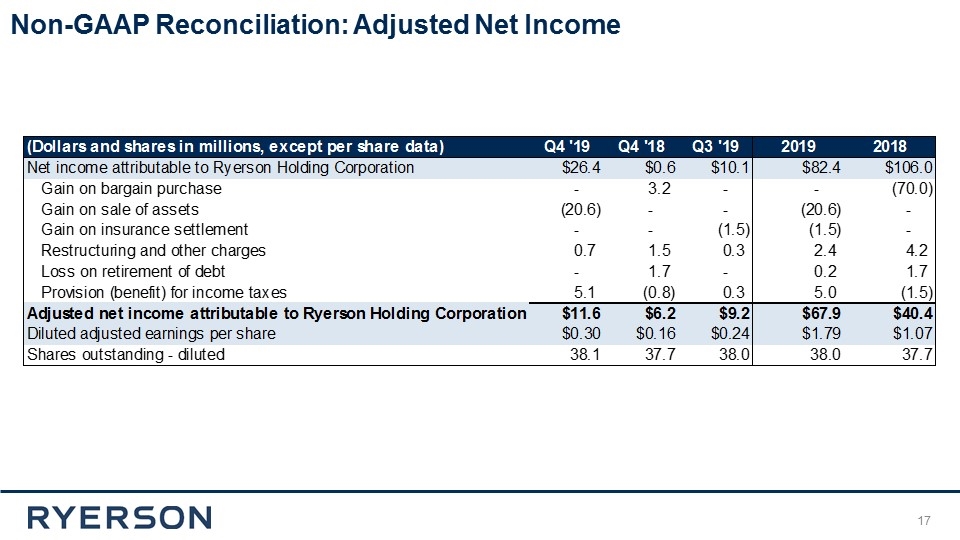
Non-GAAP Reconciliation: Adjusted Net Income

